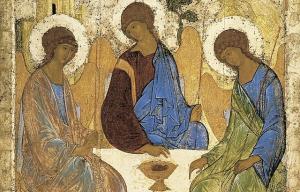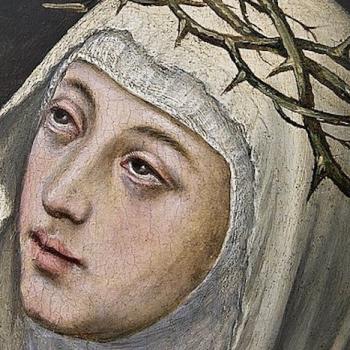
Andrey Rublev – Св. Троица – Google Art Project.jpg
It’s Saturday: let’s talk about the Trinity. (Not for the first time in this column. Nor for the second.)
Actually let’s zoom in through an adjacent question: why do Christians baptize in the name of the Father, Son and Holy Spirit?
The easy answer to that one is “Jesus told us to.” But “Jesus said” or “the Bible says” is how theologians begin their contemplations, not how they end them. So: what is the meaning of the formula Jesus gives in Matthew 28:19? Can we get any ah-ha!s from it?
Was Jesus baptized in the Triune name?
Let’s take one more step back and look at Jesus own baptism.
And when Jesus had been baptized, just as he came up from the water, suddenly the heavens were opened to him and he saw the Spirit of God descending like a dove and alighting on him. And a voice from heaven said, “This is my Son, the Beloved, with whom I am well pleased.” (Matthew 3:16-17)
These verses show us the kind of relationships that Jesus is caught up in. The Spirit comes to rest on him. And when that Spirit lands, he can hear the voice of his parent: you are my beloved child.
These relationships guide Christ through his life. When the Spirit rests on him, he can hear the voice of the one he calls Father. The tragedy of the story comes on the cross, when Jesus can neither see the Spirit nor hear the Father. And the comedy comes on Easter morning, when, as Paul puts it, the Spirit comes from the Father to give life to the dead body. Easter is his baptism all over again: the Spirit rests, and the Son wakes up knowing that he is his Father’s beloved. Finally, at his ascension–which is like the endgame of baptism–the Spirit who descended to him now ascends, taking the Son along for the ride so both can rest in the arms of their loving source.
So Jesus’ baptism, like his entire life, has a trinitarian shape.
Wait… Does the Trinity only have one name?
OK. Good story, theologian. But isn’t the doctrine of the Trinity about more than that? Not just the incarnate Jesus’ experience, but the being of God? Isn’t it about weird quantum math of making three into one and one into three? The doctrine of the Trinity is the Shrödinger’s cat of theology.
Let’s pause there for a moment and return to the line from Matthew 28. “Baptizing them in the name of…”
What is the name of Father, Son, and Spirit? Notice the text does not say “names,” as if Jesus were telling us to make sure we mention all three. “The name.”
I suspect (and I’m not alone) that “the name” is the one God gave Moses in Exodus. A name so strange and new that Moses couldn’t quite pronounce it: the name YHWH. This YHWH is God and, as the shema from Deuteronomy reminds us, YHWH is one (6:4).
So we’ve got a gospel story that shows us three characters involved in God’s work, and a Jewish prayer reminding us that God is one (or “alone”). The very fact that the early Christian theologians interpreted the evangel with an eye on the shema is evidence that the Christian account of God did not originate as an anti- or post-Jewish doctrine. These are three persons with one ancient name.
So it is one, or three?
Back to the scene in the Jordan. “You are my beloved.” The one Jesus calls Father is one who loves. And God, whose name never changes, does not become love at that moment. God is love with no beginning and no end. Love is eternal in God. It is the being of the one God. And if God is love, this means that God has always been a lover, always had a beloved, always sent the Spirit of love to that beloved, and always awaited the return of that Spirit of love from that Beloved. Love is the being of the one God that was, is, and ever shall be a relationship of three.
Jesus’ baptism then is a story that happens in the Jordan, but beyond that a story that takes place in eternity. The word “God,” for Christians, means something like a parent who loves a child, and who sends their own Spirit to rest on that child.
This is why Father, Son, and Spirit only have one name. YHWH is the name of all 3—the last name you might say, and Paul more or less says this when he calls Jesus the Greek version of “Our YHWH.” We can only call him that, he tell us in the first letter to Corinth, if the Spirit of the holy one tells us that is his name.
Father, Son, Spirit: YHWH the lover, YHWH the beloved, and YHWH the love that moves and rests upon both. This is the eternal love story, the divine dance that gives shape to all of creation.
OK… but is the Trinity good news, or just weird math?
Fair question.
Notice how Saint Paul closes out his most difficult love letter, by which I mean 2 Corinthians. “The grace of the Lord Jesus Christ, the love of God, and the communion of the Holy Spirit be with all of you” (13:13).
Paul’s Trinity-shaped blessing asks that the grace, love, and communion of the three persons be with us all. He wants to include us in that dance of love that Jesus felt himself gathered into at the Jordan.
Knowing this God of love is “with us” helps us see why theologians made the math as weird as we did. We could have solved it differently. We could have said:
-
- God isn’t really one, but is instead three. (But then the Jews are wrong about God.)
- God used to be one, but became two at Christmas and three at Pentecost. (But then God changes names, and only the pre-Jesus Jews were right.)
- God is still one, but seems like three when God comes to gather us up. (But then the love of God is not really with us, as Paul wants us to know it is: receiving the Spirit that lets us stand with Christ and call God Father would be a deception. Those relationships would not be true to God’s being.)
No, there’s no getting around it. The God of Christianity is eternally the set of relationships that have one name.
What does Trinitarian baptism mean for us?
Pauls’ favorite metaphor for this is adoption. The divine parent has a single natural child, an only begotten. That only begotten receives eternally the Spirit of that parent’s love. And we, made in God’s image, are called by that same name and receive that same gift of love. That’s what happening at our baptism.
We get to stand alongside Jesus the Son in the Jordan, feel that same Spirit come to rest on us, and so hear God calling us “beloved child.” It’s as if the Spirit brings us adoption papers, Paul says: your birth name is not YHWH, but God loves you as if it were.
To baptize in the name of the Father, Son, and Holy Spirit is to let the love that is God’s eternal name engulf each life that comes to share in this faith. Remember Easter, the day that God said “love” so strongly and clearly that even death could not block its power? That God, Paul says, wants to give life to your mortal body also. If you’re ready for that.
You are God’s beloved child. And if you will look for the moments when God’s Spirit descends and rests on you, then I believe you will hear the voice of the divine parent saying “You are my beloved.” That, I hope, you will find to be good news.
Adapted from a sermon at All Saints Episcopal Church, Austin
Trinity Sunday 2023











